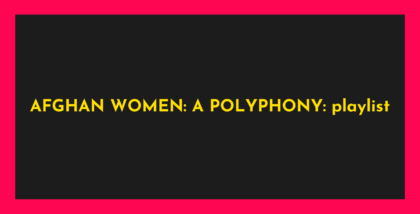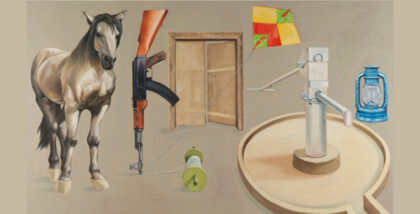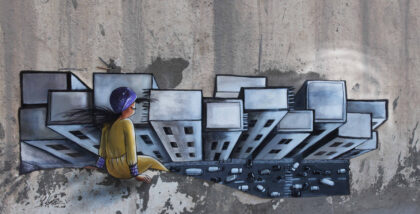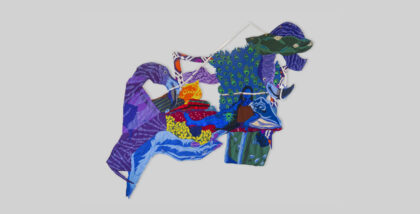 Untitled, Shamsia Hassani. Courtesy of the artist.
Untitled, Shamsia Hassani. Courtesy of the artist.
“Agar Chaderi bpushin, gender qaar mee shay.”
“If you wear a burqa, gender will get mad,” the driver of the hired car said to me as I was putting mine on. We were approaching the eastern city of Jalalabad, from Kabul, on our way to Torkham, the main border post between Afghanistan and Pakistan. “Gender” (or jendar, as it is pronounced in Dari) in Sher Alim’s seemingly innocuous statement, emerged as a person—with feelings of happiness as well as anger, and a preference for women not to wear a burqa. Gender will get mad.
As I observed as a researcher in Afghanistan from 2003 to 2013, gender as a secular, liberal (read: white) feminist ethic was “mainstreamed” into the lives of Afghans over the course of the US occupation. “Mainstreaming” is the official development and policy term for how particular conceptions of gender were imposed upon a subaltern population by an occupying power, largely via multi-million dollar programs meant to “empower” women and girls. While purporting inclusivity, these initiatives often ended up alienating women and demonizing men. Thus the word “gender,” used in both Dari and Pashto in its untranslated English form, acquired negative connotations, laden with confusion, expectation, ambivalence and inextricably linked to the vast military-development nexus that has shaped Afghanistan over the past 20 years.
*
During my time in Afghanistan, I witnessed an awkward drama scripted by these imperialist priorities of gender mainstreaming. I was a spectator to, participant in, and advisor for what I call the “handshake dilemma”—between foreign men and Afghan women, foreign women and Afghan men, Afghan men and Afghan women, and for young Afghans seeking advice on how to navigate cosmopolitan spaces to which they suddenly seemed to have access.
It is not customary for Afghan women to shake hands with non-mahram, a term in Islam used to demarcate gender-related practices between men and women. For a woman, mahram includes her father, brother, uncle, son and those who have not reached puberty; in front of them she does not have to observe hijab. Non-mahram would basically be an unrelated male or a distant relative to whom marriage is theoretically possible, and in the presence of whom hijab must be observed.
Unfortunately, foreigners in Kabul were unaware of such intricacies of Muslim sociality. If anything, Muslim life and what they saw as archaic customary practices was what had to be reformed in order to advance their own views of gender equality, women’s liberation, and progress. While the handshake dilemma is not unique to Afghanistan, Afghan women who worked in the development sector in Kabul expressed that shaking hands or the tactics required to avoid shaking hands was a daily nuisance. I saw Afghan women in offices who, when about to meet a non-Afghan man, would maneuver to preempt the handshake by using an exaggerated alternate gesture, such as placing a hand over the heart, which served as a greeting while also indicating their wish to not shake hands. I myself developed such tactics; I would purposefully carry items in my hands when I went into meetings to make a handshake physically impossible, or would show up late to meetings (blaming Kabul traffic) to avoid these rituals. A host of techniques were deployed to either impede the handshake altogether or perform an abridged, fumbling version of the gesture to get past the whole thing as quickly as possible.
Maryam, a 25-year-old intern for an American NGO in Kabul, was engaged to be married. She was shy but had a strong personality. Her weekly meeting with her American male supervisors was where she had to encounter handshakes. She would acquiesce, rationalizing that she did not want to risk her job or make her bosses feel uncomfortable if she refused to shake their hands. A month later, an Afghan man and colleague of Maryam’s began greeting her every morning with a salaam and a firm shake. She was even more uneasy shaking hands with this Afghan colleague and was surprised that he would put her in such a position. She was reluctant to embarrass him, but felt quite anxious and upset about the daily handshake. Two weeks after the initial handshake, the Afghan colleague asked if she wanted to start a romance. She was stunned, not only because everyone in her office, including this particular Afghan handshaker, knew she was engaged, but because she could not understand what she could have done to make him think she was interested in him. She refused his proposal and asked him why he thought she was interested. His answer was simple: if you were not interested, then why did you shake my hand every day for two weeks?
Maryam’s travails parallel the experiences of female students at Kabul University, who described a handshake attempt by an Afghan boy as a test to see if the girl is azaad, or free—meaning, the kind of girl who would be open to a relationship outside of marriage with a boy. If a girl concedes to a handshake, she might be perceived as weak or vulnerable to boys’ advances. Or, her willingness to shake hands might mark her as licentious. In this new social recoding of bodies, gestures, language, and sensibilities, the possibilities for interpretations widened significantly.
There were also scenarios in which Afghan men felt they were compromising their sense of self. For example, scholarship interviews for studying in the US became stressful moments for young Afghans whose futures were on the line. I was often consulted by students about what to do in varied contexts:
“Should I shake the hands extended to me, or not?”
“Should I offer my hand if there are men in the room?”
“Should I offer my hand if there are women in the room?”
“Can I offer my hand only to those who are the same gender; is that rude?”
“Should I wear a brace on my arm and pretend it is broken?”
“If I do not shake hands will they read my not wanting to shake hands as a marker that I am Taliban and/or too conservative, too Muslim, and thus an unsuitable candidate for study and integration into US life in general?”
To shake or not to shake had high stakes.
*
For many throughout Afghanistan as well as those living as refugees in Iran and Pakistan, Kabul jaan had been an aspirational idea, envisioned as a place for Afghans, ever since the Soviet occupation began in 1979. Jaan is a term of endearment, used for someone or something that is part of your soul, that you cannot be the same without. But as Afghans who had spent decades exiled in neighboring countries optimistically came to Kabul post-2001, they had to share a Kabul that was also being turned into an Orientalist dreamscape by both foreigners and the diaspora from the West. The city became a physically and socially-engineered space, occupied by foreign schemes and colossal security machinery designed primarily to protect outsiders. As foreigners indulged in lavish parties and trampled the roads in tedious armored SUVs, accessing restaurants and places that Afghans themselves were forbidden from entering, Kabul became a landscape of exclusions, a scene of hospitality where the hosts themselves were not welcome. This sat uncomfortably with simultaneous claims that Afghans had to “own” the project of nation-building. Alongside these material and spatial exclusions were the ideological ones that Afghans had to navigate on a daily basis. Offices were configured to be mixed-gendered spaces, and this intervention was sold to Afghans (and the world) as a strategy of inclusion. But this was also a clear statement about whose sensibilities and comfort ultimately mattered, thereby turning a supposedly inclusive practice into yet another form of exclusion for Afghans.
Once, I was approached by a group of four American men who, like me, taught at the American University of Afghanistan. They all offered their hands to me at the same time. I exaggeratedly put my hands on my heart and left their four hands suspended in mid-air for an awkward few seconds. I tried to turn this into a friendly cultural teaching moment by explaining the dynamics and ethics of the handshake in Kabul and how they should not offer hands to an Afghan woman, but instead take their cue from her. Weeks later I was told by many students and two other professors that most of the faculty and administrators of the university believed that I was a Taliban sympathizer. Their evidence? I am Pashtun and I refused to shake the hands of four non-mahram men in the modern, socially progressive university in Kabul. The social exclusion that followed my refusal to shake hands marked a new form of colonial ordering and imperialist subject formation. I had set a bad example for the impressionable students by being the embodiment of regression—the uncivilized, the savage that haunted the project of modernity.
Maryam’s acquiescence and my failure to acquiesce to the handshakes offer a glimpse into the spectrum of consequences for women in Kabul. Refusing was evidence of a dangerous conservatism, incongruent with “progress” and the “new” Afghanistan. In the racialized logic of occupied Afghanistan, Afghan bodies were repurposed to establish boundaries between tradition and modernity. Wearing a burqa or not, shaking hands or not, making “gender” angry or happy, came to signal one’s fitness (or lack thereof) for democracy, rights, and “freedom.”
*
The return of the Taliban to Kabul in August 2021 was understood in the West as an instant loss of hard-earned “progress.” This loss, primarily measured by what Western observers could recognize as “women’s rights” and girl’s access to education, is being mourned even while the deaths of thousands of Afghans have yet to be recognized as mournable. Presenting loss so starkly and consistently in the gender-focused terms of Western intervention also reveals how little work has been done to expose the racialized violence enacted upon Afghans through the humanitarian development industry.
“While modernity is presented as a rhetoric of salvation, it hides coloniality, which is the logic of oppression and exploitation,” writes Walter Mignolo. “Modernity, capitalism, and coloniality are aspects of the same package of control of economy and authority, of gender and sexuality, of knowledge and subjectivity.” Coloniality ensures that the work of Empire remains, that the imperial debris persists long after the historical event ends.
Afghans were performing colonial modernity to be intelligible in the metastasizing, “progressive” spaces of the new nation, and their performances helped obscure the symptoms of a violent occupation that prevented them from articulating their own aspirations. This is the ultimate cost: the repeated evacuation of Afghan agency. The discomforts Afghans felt and told me about the handshake dilemma are instances of such loss. What does self-determination, sovereignty, or consent look like when the new reality has been designed to put you in conflict with your own customs? If it changes how you relate to your body, and to the bodies of others? If you are forced—in order to pass the litmus tests of “modernity,” “progress,” or simply employability—to compromise your bodily integrity and sexual autonomy?
A form of colonial violence against Muslim subjects—akin to what is unfolding throughout present-day Europe—was enacted through handshakes in Kabul, demanding Afghans prove their “modern” desires. Like past colonial missions of “liberation,” “civilization,” and “progress” in Afghanistan, gender mainstreaming alienated Afghans from themselves, and never fulfilled its own promise. Afghan women were not given more autonomy; rather, Afghans were forced to acquiesce to the invaders’ moralizing ethics and imperialist salaams.
























